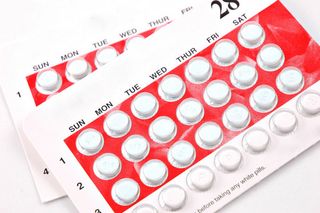No Period Please: Many Women Skip Menstruating

Many young women use their hormonal birth control to skip periods, mostly for convenience's sake, recent research finds.
Skipping menstruation is safe for most women, according to the Mayo Clinic, which was not involved in the research. The new study, published in January in the journal Contraception, is one of the first to examine why women do so.
Researchers from the University of Oregon surveyed 1,324 women, both undergraduate and graduate students, who reported using hormonal contraceptives within the last six months. Hormonal methods include the oral pill as well as patches and vaginal rings. [Birth Control Quiz: Test Your Contraception Knowledge]
Of these women, 17 percent said they'd altered their bleeding pattern by skipping over placebo weeks in their pill packs or applying a new patch or ring as soon as the old one was finished, without taking a week off. Because women on hormonal birth control cease ovulation, the week-long bleeding they experience every month is not a true period, which is caused by built-up uterine lining sloughing off, but is withdrawal bleeding caused by the removal of the hormones.
Some pills are designed to lengthen the cycle between bleeding periods. These extended-cycle birth control pills allow women to have a period every three months or even just once a year.
Of women who delayed or skipped a period, half said they did so for convenience or for scheduling purposes — to avoid bleeding during a particular time of the month. About 30 percent said it was a personal preference, and 16.7 percent said they wanted to avoid menstrual symptoms.
"These findings emphasize the need for health-care providers to carefully interview combined hormonal contraceptive users on how they are using their method — for example, many women may be skipping pills to extend their cycles," study researcher Christopher Minson, a human physiology professor at the University of Oregon, said in a statement. "With a greater understanding of the issues, health-care providers may be able to more effectively engage in conversations with college-aged women and educate them about available options."
Sign up for the Live Science daily newsletter now
Get the world’s most fascinating discoveries delivered straight to your inbox.
Provider education might be important, given that 53 percent of women who'd skipped a period reported doing so on the advice of friends, family or other nonmedical sources. Downsides to delaying or skipping a period include breakthrough bleeding, or bleeding that occurs between periods. Women who skip the bleeding period may also be less likely to be able to tell if they've gotten pregnant despite their birth control.
Follow Stephanie Pappas on Twitter and Google+. Follow us @livescience, Facebook & Google+. Original article on LiveScience.com.

Stephanie Pappas is a contributing writer for Live Science, covering topics ranging from geoscience to archaeology to the human brain and behavior. She was previously a senior writer for Live Science but is now a freelancer based in Denver, Colorado, and regularly contributes to Scientific American and The Monitor, the monthly magazine of the American Psychological Association. Stephanie received a bachelor's degree in psychology from the University of South Carolina and a graduate certificate in science communication from the University of California, Santa Cruz.
Most Popular

